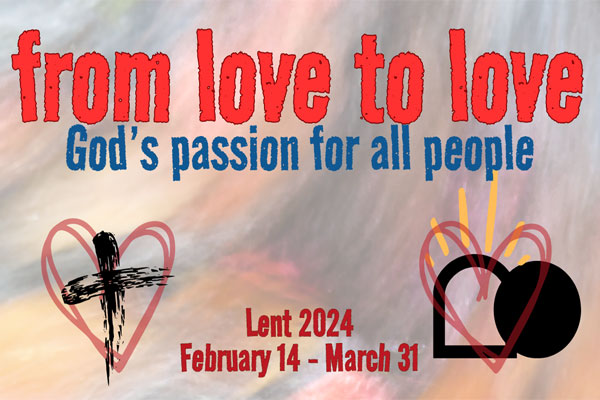
Fasting from the Feast During Lent
Admittedly it’s an odd fast to keep, to give up Holy Communion during Lent. Our church teaches that in the bread and cup of Holy Communion our Lord gives himself to us in a special way. “This is my body, given for you. This is my blood, shed for you.” As Lutherans, we take these words – and the practice of Holy Communion – seriously.
So why would we pause from receiving the sacrament?
For some of us the experience of sharing communion at home has gotten a bit sloppy, inconsistent, or just odd as the pandemic has worn on. Oh, right, communion! Well, here’s half a hamburger roll. Do we have any grape juice or wine? Uh, well, would orange juice or water work? The communion we’ve shared at home has been real, no matter how ragtag it might feel at times. Even with our last-minute elements and forgetfulness, we’ve been united across time and space with our Lord and with the whole Christian Church by those words of promise – “This is my body, given for you. This is my blood, shed for you.”
The Means of Grace
Holy Communion is a gift of God, one of the three “means of grace” that God gives to the church to steward and use for the comfort and nourishment of God’s people. The three “means of grace” are the Word of God, Holy Baptism, and Holy Communion.
- The Word of God – Jesus is the Living Word of God, received in preaching and the proclamation of Scripture, in Bible Study and in singing hymns, in the promise of Christian fellowship and in the confession and forgiveness of sins.
- Holy Baptism – in Holy Baptism our Lord washes us of the stain of sin and gives us the promise of new life. In baptism we are joined to Christ’s death and resurrection, and made one with his body and the whole church.
- Holy Communion – in Holy Communion Jesus gives himself to us in bread and cup, the Passover lamb who frees us from bondage to sin and leads us into new life. In receiving his body and blood, we share in an eternal feast that reveals to us the abundance of God’s grace.
The Use of the Means of Grace: A Statement on the Practice of Word and Sacrament, is our church’s guidelines on how we steward these means of grace. It was adopted by the Churchwide Assembly of the Evangelical Lutheran Church in America in August of 1997, and would make for a great short-term study in our congregation.
This Lent we will pause from feasting at the Lord’s Table, but we will not be without real means of God’s grace. Instead, we will turn our attention toward the Word of God and Holy Baptism as means of God’s grace that sends us into the world in mission. Each week in worship you will be invited to recall your baptism by marking the sign of the cross on your forehead, perhaps with a scented oil or with water from a small bowl.
And, throughout this season of fasting I will offer reflections on Holy Communion, inviting each of us to prepare spiritually to receive anew the gift of Holy Communion during our Holy Week and Easter services.
May God bless us in our Lenten fasts, and nurture us through the renewing of baptism and the promise of God’s Living Word.
Peace be with you.
Pastor Chris Duckworth
New Joy's Lent Schedule of Worship
Lent begins on Wednesday, February 17 with Ash Wednesday worship at 7pm online. As we will not be meeting in person, there will be no imposition of ashes this year. Lent concludes during Holy Week, when we host our Good Friday service on April 2, 7pm. Easter Sunday worship is April 4, 9:30am.
Brief, spoken midweek prayer services will be held on Wednesdays during Lent via Zoom at 6:30am, 1pm (at the start of Midweek Bible Study), 7pm, and 10pm. They will each be similar in nature. I’m leading these services at different times understanding the different schedules each of us have. I hope that with these four different times of prayer more might be able to participate in common prayer during the season of Lent.
Worshipping with our Bodies
February 16, 2024 Posted By: Pastor Chris Duckworth Ministry Blog bodyWorshipping with our Bodies Among Western Christians there can be...
From Love to Love: God’s Passion for All People
February 5, 2024 Posted By: Pastor Chris Duckworth Ministry Blog lentFrom Love to Love: God's Passion for all People Lent,...
Job Opening: Parish Administrator
January 17, 2024 Posted By: Pastor Chris Duckworth Ministry Blog administratorJob Opening at New Joy Lutheran The New Joy Personnel...




